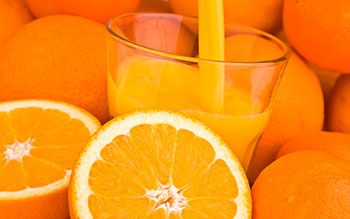More Health and Nutrition Bites
Related
Another Reason to Avoid Sugary Drinks: Your Blood Pressure
Drinking sugar-sweetened beverages such as soda, lemonade, sweetened
fruit drinks and punches has been shown to be linked to obesity,
leading to diabetes and heart disease. Being overweight is also linked
to high blood pressure, which can also lead to heart disease, as well as
stroke, kidney disease and a higher risk of death from all causes - which
means a shorter life expectancy.
Visualize the Sugar
I've written easily half a dozen reports on different research articles focusing on the effects of drinking sugar-sweetened beverages on your weight and your kids' weight as well as contributing to high blood pressure, poorer cholesterol scores, diabetes, gout, and kidney disease.
Should you be concerned about the sugar in your kids' cereal?
If you've been following Dr. Gourmet for more than a little while, you're probably aware that I feel that breakfast really is the most important meal of the day. Studies show that those who eat breakfast have better cholesterol scores, lower Body Mass Index and tend to eat less throughout the day.
Health & Nutrition Bites
Get the latest health and diet news - along with what you can do about it - sent to your Inbox once a week. Get Dr. Gourmet's Health and Nutrition Bites sent to you via email. Sign up now!
Daily juice intake linked to higher central blood pressure

If you've kicked your soda habit in favor of juice - because it seems healthier - you might want to rethink that decision.
A study recently published in Appetite (2014;84:68-72) correlated the juice intake of 146 elderly men and women with their central blood pressures, finding that those who reported drinking fruit juice on a daily basis had "significantly" higher central blood pressures than those who never drank juice or only drank it rarely.
Central blood pressure refers to the blood pressure in the aorta, close to the heart, and is more directly related to the risk of cardiovascular disease, stroke, and cognitive impairment than what is known as brachial blood pressure - the blood pressure as taken with a cuff, on your arm. As a person ages, the aorta loses its elasticity and becomes stiffer, resulting in higher central blood pressure. This is often not reflected, or reflected only minimally, in the brachial blood pressure, making it an important indicator of heart health in the elderly.
The participants in the study were all recruited from the community and were living independently. All were without diagnosed heart disease, diabetes, or neurological problems, and were non-smokers. A food frequency questionnaire asked the participants to recall their intake of various foods and beverages, including fruit juice, over the last year. Their brachial blood pressures were taken on multiple occasions in the same laboratory visit, then their central blood pressure was measured using a sophisticated device that has been shown to accurately estimate the central blood pressure by measuring pressure waves from the aorta to the wrist.
Those who drank fruit juice on a daily basis had a central blood pressure 4 points higher than those who never drank juice and 3 points higher than those who drank it "rarely" or "occasionally" - and this held true even when the scientists excluded those who were being treated for high blood pressure.
What this means for you
We've seen that drinking sugar-sweetened beverages has been linked with higher blood pressure in this study from 2010. That study was prospective, meaning that it followed a group of people over time, which allows us to show a causal relationship between sugar-sweetened beverages and blood pressure. By contrast, this study can only show correlation, not causality, but the authors themselves point out that this study "was designed to be hypothesis generating" - meaning that more research is needed. That said, fruit juices offer a lot of sugar (whether added or intrinsic to the fruit) and not nearly as much fiber as the fruit itself. Skip the juice in favor of eating the fruit - you'll get the same vitamins and minerals along with satisfying fiber.
First posted: November 19, 2014
